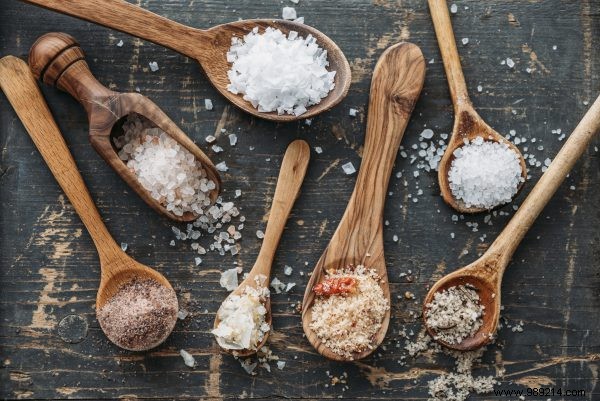
Salt doesn't have a great reputation. Should you ban the salt shaker from your kitchen for good? Or are there healthier alternatives? Discover the answers here.
First the good news:salt is indispensable for your body. Every day you consume about two grams for three essential bodily functions:your fluid balance, your blood pressure and the functioning of your muscle and nerve cells. Your body has a built-in system for getting rid of a surplus of salt:through the urine and through perspiration. Good to know for sports billies with an active lifestyle:if your program includes a sweaty workout three to four times a week, your body will release just a little more salt than non-athletes do.
Read also: ‘What about salt in your diet?‘
All the salt you eat is absorbed by your body through the small intestine and ends up in the bloodstream. After that, the salt in the large intestine removes moisture from your food. Your kidneys are the most important organ for you to excrete. Up to six grams per day is no problem, but for anything above that they have to work extra hard. In the long run, this can lead to overloaded kidneys and even kidney failure. Reluctant kidneys can be recognized by stinging or colic low or in the middle of your back. Do you ever suffer from this and do you eat relatively salty? Then go to your doctor to be sure.
Tip:how salty do you eat? Take the test at Nierstichting.nl/zoutmeter.
Too much salt in your body can raise your blood pressure. The culprit is the sodium in salt. It is not known exactly how this works. It is clear that sodium plays an important role in the water and salt balance in your body. The same system also regulates your blood pressure; so they are linked. If you have a structurally high blood pressure, your vessels damage and your arteries calcify – which become thicker and less flexible. Your heart then has to work harder to pump blood around your body. What is too high? A healthy blood pressure for adults is 120/80. If you have your blood pressure measured at the doctor's, then we speak of high blood pressure (hypertension) at an upper pressure (the moment the heart contracts) from 140 mmHg and/or a lower pressure (the resting phase between pumps) of 90 mmHg. At home you can maintain an upper pressure of 135 mmHg. Only after several measurements over a longer period at different times do you really have a reliable picture.
A pinch of Hawaiian black salt with volcanic activated charcoal, crystalline fleur de sel, Maldon sea salt flakes,
Himalayan salt or Celtic swamp salt:it can't get any hipper. But do they also do much more for your health? You can take this with a large grain of salt:for example, Celtic sea salt contains almost as much sodium and calcium as regular table salt. Paulien Vinke:“Often more potassium, magnesium, sulphur, zinc or iron has been added to these varieties, but in such small quantities that it has little or no effect. And they are also very expensive:they mainly do something for your wallet instead of your health.”
Read also: ‘Did you already know this about salt?‘
Eating too much salt is bad for your health. But how do you notice that? Check whether you recognize these effects.
Table salt (sodium chloride) consists of two minerals:sodium (0.4 grams per 1 gram of salt) and chloride (0.6 grams).
Only if you structurally consume too much sodium does the risk of health problems increase. But that doesn't happen overnight or if you've got rid of a little too many cheese sticks and chips during the holidays. Nutritionist Paulien Vinke:“If you have taken in more salt than you need for a while, you can get complaints such as headache, increased blood pressure and more fluid retention. But they usually disappear if you pick up your healthy eating and living pattern.”
Too salty food often sneaks in. You don't pay much attention to it or you get used to the salty taste of the food. According to Paulien
Vinke then increases the risk of structural health problems – certainly in combination with too little exercise, a lot of stress or being overweight. Too much sodium can also make your blood pressure too high, resulting in a higher risk of cardiovascular disease. But certainly not everyone who eats too much salt will get high blood pressure. How sensitive you are to it is largely determined by these three factors:heredity, diet (fresh and varied) and lifestyle (as active as possible).